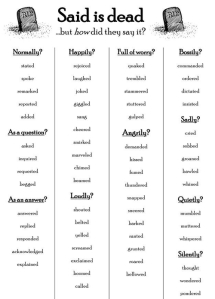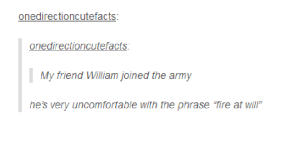Have you heard the word? Said is dead.
The verb “to say” is essential in the English language. It’s essential for all writers, fiction and non-fiction (yet my examples are, and my main focus is, pertaining to fiction). “To say” indicates dialogue, indicates that someone is speaking. But, alas, the word has become over used. That is not to imply that one should never use “said”, however. I’m simply suggesting that there are other, more expressive, more stylistically effective ways of saying “said.” Take this example, a line from J.R.R. Tolkien’s The Return of the King:
“His love for Frodo rose above all other thoughts, and forgetting his peril he cried aloud: ‘I’m coming Mr. Frodo!'”
What if Tolkien had written “His love for Frodo rose above all other thoughts, and forgetting his peril he said aloud: ‘I’m coming Mr. Frodo!'”
That doesn’t sound as expressive, as emotional. Using the word “cried”, the author is able to imply the serious, heart-felt love and devotion Sam has for Frodo. Using the word “cried” makes me picture Sam leaping up from his sorrowful state, crying out with fervor, “I’m coming Mr. Frodo!”
Here, take another example, this time from Ian McEwan’s Atonement:
“’I know you never liked that sort of thing, Cee. But how else do you become a doctor?’
‘That’s my point. Another six years. Why do it?’
He wasn’t offended. She was the one who was overinterpreting, and jittery in his presence, and she was annoyed with herself.
He was taking her question seriously. ‘No one’s really going to give me work as a landscape gardener. I don’t want to teach, or go in for the civil service. And medicine interests me … ‘ He broke off as a thought occurred to him. ‘Look, I’ve agreed to pay your father back. That’s the arrangement.’
‘That’s not what I meant at all.’”
Here the author doesn’t use any verbs to indicate the characters are speaking. Yet we know exactly who is talking, because of the words they say. The first line spoken is from Robbie. We know this because he uses Cecilia’s nickname, Cee, when speaking to her. And we don’t need to know that Cecilia spoke the next line, because it’s obvious, since they are the only two at the fountain. Another clever tactic McEwan employs is describing the characters’ actions before and after they speak. Look at the paragraph beginning with “He was taking her question seriously.” It’s clear the he is Robbie, because, once again, we know Robbie and Cecilia are the only two in the direct conversation. The line that follows is Robbie’s dialogue. We know it’s his because McEwan has already drawn attention to Robbie’s actions.
Once more McEwan indicates the character’s speech pattern without actually using “said” or a derivation of it. He writes: “He broke off as a thought occurred to him.” This line transitions from each of Robbie’s lines, indicating that he breaks off from one thought, as another occurs and he says it out loud.
There are many ways to say “said” without actually saying “said.” There are other words for it, more specific, descriptive words that indicate feeling, like Tolkien’s use of “cried”. Here’s a helpful chart I came across that inspired this post:

But you don’t always need words to say “said”. Like McEwan, you can indicate who is speaking through use of names, use of action, by specific speech patterns, etc.
Here are some examples for saying “said” without actually saying “said” I came up with:
1. Use of names.
Rachel and Kelly walk along, under the yellow light of the lampposts, two best friends arm in arm in the empty, twilit street.
“Look at the stars, Kell. Aren’t they beautiful?”
2. Use of action.
In the desperate scramble, the photograph slips from Charles’ wallet, fluttering to the floor.
Pietro snatches it up in one quick movement, holding it closer to his face to see. “Where did you get this?”
3. By specific speech patterns.
James’ Scottish lilt tends to come out in desperate circumstances, like when he’s angry, terribly sad. Or like now, when he’s horribly drunk. “Ah know; but just a wee bit more.”




